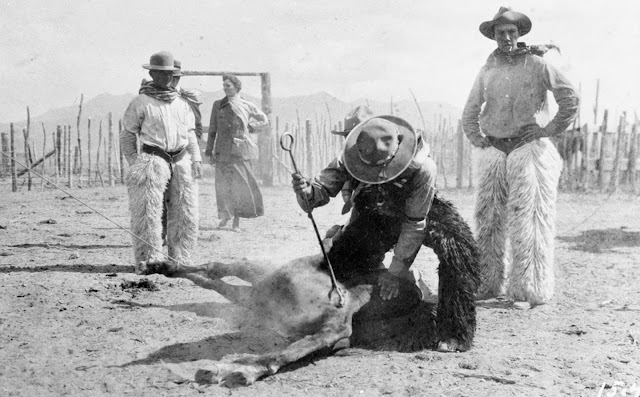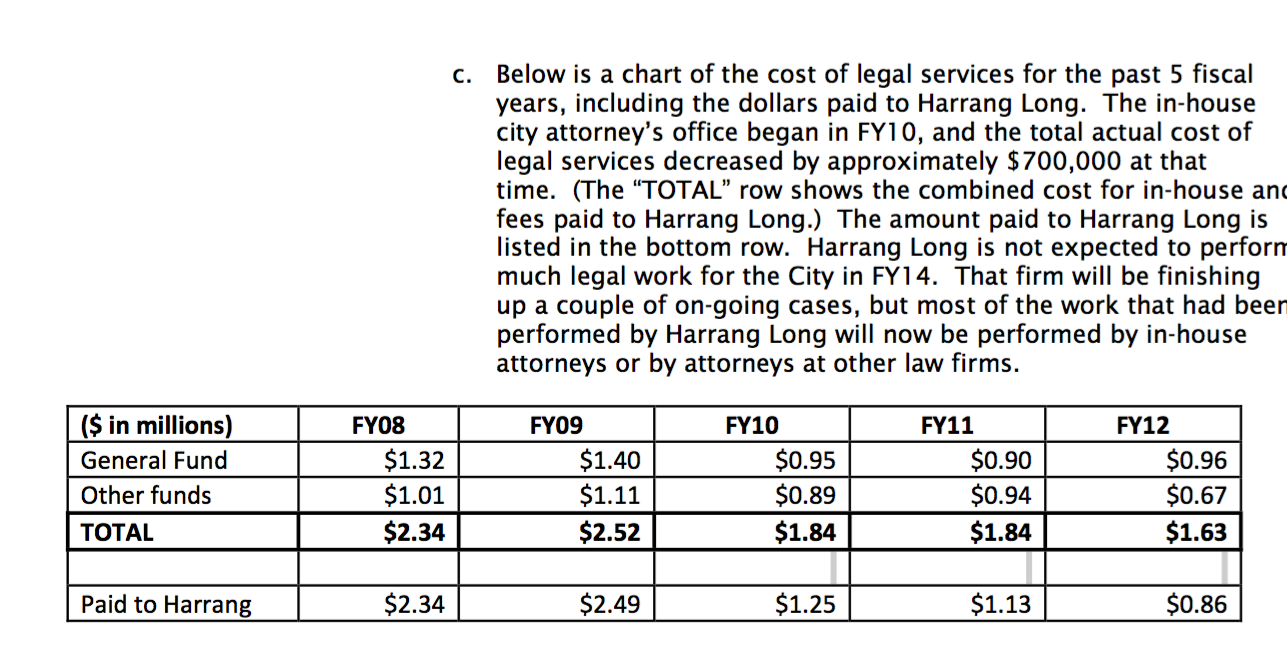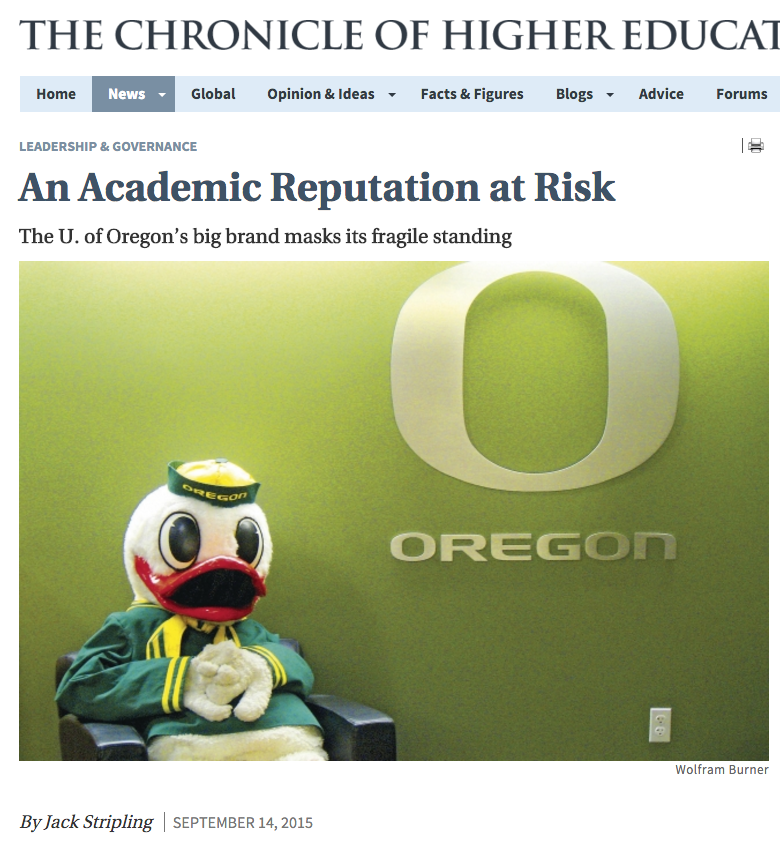7/20/2016 update: “What If” President Schill carried through on his promise to redirect 160over90’s branding bucks to new faculty hires? He has, as “Around the O” reports here.
1/20/2015: Faculty delight as “inane and insulting” 160over90 branders chased off campus
Kellie Woodhouse of InsideHigherEd has a report with many interesting quotes, here:
The University of Oregon’s decision to cut back its multimillion-dollar branding campaign has many faculty at the institution cheering. …
The change of course appears to have built good will among faculty members, many of whom complained the “If” campaign is too generic. A video for the campaign, for example, shows vague scenes and programs from Oregon’s campus, and doesn’t highlight with any detail the specific academic programs at the university.
“The original campaign was inane and insulting, and we were really disappointed that the Board of Trustees and our former president decided to spend that much money on advertising instead of addressing the university’s real problems,” said Bill Harbaugh, an economics professor and president-elect of the Oregon’s University Senate.
The quotes from President Schill’s new VP for Communications Kyle Henley are circumspect about the quality of 160over90’s work and the financial gains from ending the contract, as should be expected given the Chair of UO’s Board of Trustees past support for the branding:
Chuck Lillis, president of the UO Board of Trustees, built a $60-billion-plus empire on his background in marketing. Lillis earned a doctorate in marketing at the UO in 1972. …
Lillis, the inaugural chairman of the UO board — and $14 million donor to the UO business college — is squarely behind the 160over90 campaign.
“We can’t spend $3 million more intelligently than this,” he said recently.
That’s OK, Kenley deserves plenty of respect for doing the deed.
1/17/2016: UO Pres Mike Schill uses 160over90 ad firm to establish his “academic brand”
By firing their useless asses and putting the money to hiring new faculty for UO.
Schill is getting a lot of positive press for this. Diane Dietz’s report in the RG on Thursday now has 3.6K Facebook likes, including plenty of faculty nationwide:
The University of Oregon has pulled out of its high-profile three-year, $3.4 million contract with Philadelphia branding and advertising firm 160over90, and is redirecting money toward university academic and research goals, the UO said Wednesday.
… UO administrators negotiated a Jan. 1 end to the contract, which cost the UO about $40,000 in penalties but saved $400,000 to $500,000 in further spending, [VP for Communications Kyle Henley] said in an e-mail. The UO has paid 160over90 about $3 million in all. [And had planned to spend $20M over 5 years.]
InsideHigherEd and the Chronicle of Higher Ed are both doing stories on this. Perhaps the Chronicle story will be a bit more positive than Jack Stripling’s September report on UO. (Still gated, extracts here.)
And the Register Guard’s Editorial Board notes that Schill has picked up “Oregon values” pretty quickly, for a New Yorker:
Any rancher could have told the University of Oregon that a brand isn’t worth much without a steer to put it on. UO President Michael Schill has reached that understanding, and now intends to spend less on hype and more on the university’s product: academics and research. Bully for him. …

So now that the branders are gone, let’s get to work on ending Harrang, Long, Gary and Rudnick’s contract with UO for legal work. The City of Eugene did that years ago, and has apparently saved millions:

UO’s HLGR contract is here. We pay them by the hour, which creates an obvious moral hazard. So who did former Interim General Counsel Doug Park put in charge of it? Harrang’s noted big-tobacco attorney Sharon Rudnick:



I find it hard to believe that 160/90 let the UO off the hook for a $20 million commitment for just $40,000.
Initial contract was for two years. I think. RG had to petition DA to get basic public records.
The 160/90 contract was June 2014 to June 2017, so three years, for a total of $3,402,750. It was cancelled effective Jan. 1, 2016.
The $20 million was what Tim Clevenger said the university intended to spend on marketing and branding.
The University got (and spent) $5 million from alumna Connie Ballmer for such purposes.
Your comments on HLGR don’t make any sense. Virtually all law firms bill by the hour, and HLGR’s rates are standard. HLGR is one of many firms that the UO hires for its various legal needs. If it stopped using HLGR, then that work would simply flow to a different firm, which might end up costing the UO more if those new attorneys weren’t familiar with the UO’s records or otherwise lacked the particular expertise for which the UO currently hires HLGR.
You seem to have a vendetta against HLGR, but you’re actually clueless when it comes to legal needs and legal hiring.
For the curious, here’s a paper on law firm billing and moral hazard: Cashing by the Hour: Why Large Law Firms Prefer Hourly Fees over Contingent Fees, http://jleo.oxfordjournals.org/content/24/2/458.short
The paper you cited is irrelevant to this discussion. Contingent fees are for plaintiff-side cases where the attorney and client split an award. They don’t exist for transactional or advisory work, and (I’m pretty sure) that’s pretty much all HLGR does for the UO. Project-based fees exist, but those are rare and can end up being more expensive for the client if the work doesn’t end up taking long.
Like I said, you’re clueless. Stop talking about this subject.
Thanks for your comments Steve, however they are not well-developed and are not supported empirically.
Even at UO the bulk of spending on legal work is for our own internal lawyers. External lawyers paid by the billable hour are the exception. Our internal lawyers are paid with annual salaries under what amounts to a retainer contract, so they don’t have the same perverse incentives as HLGR’s lawyers do. I’ll guess that the majority of legal work is also done internally at most other universities and that the same is true for the state, the federal government, and most large businesses.
Of course there are situations where hiring an outside firm under a billable hours contract will be better, just as it might be better to hire a house-painter using a time and materials contract rather than by the job. The classic economic work on the balancing act between these contractual arrangements is by Ronald Coase, and it’s very readable. Here’s a link: http://www.colorado.edu/ibs/es/alston/econ4504/readings/The%20Nature%20of%20the%20Firm%20by%20Coase.pdf
Since you seem to have some inside knowledge on this, I’d be interested in your thoughts on the city’s decision to drop HLGR in favor of internal lawyers.
The “perverse incentives” created by the billable hour have existed for the entire history of service industries. That doesn’t change the fact that, for certain types of matters, it’s still more economical and sensible to outsource legal work than to do it in house. (For example, if when companies are sued for patent infringement, they almost always hire external counsel that has expertise in defending their particular type of matter.) All large companies and universities have both an in-house legal team as well as a large roster of different firms they go to for different services at different times. So why you think you know better than the UO’s General Counsel whom UO should hire for its legal needs, when you don’t know the first thing about what UO’s legal needs are, is a bit perplexing.
I don’t have any additional information on the city’s decision to take the work done by HLGR in house, but I assume they did it because, at the time, it made economic sense in their best judgment.
So how does one rationalize the UO hiring out to a firm that put Rudnick in the driver’s seat for faculty bargaining, when she clearly showed no insight or expertise in who faculty are or what they mean to a university? What specialized expertise in working on that particular type of matter did she provide to create value to the University, either tangible and/or intangible, for those billable hours?
It wasn’t the city dropping the firm, it was the firm dropping the city. Conflict of interest I believe.